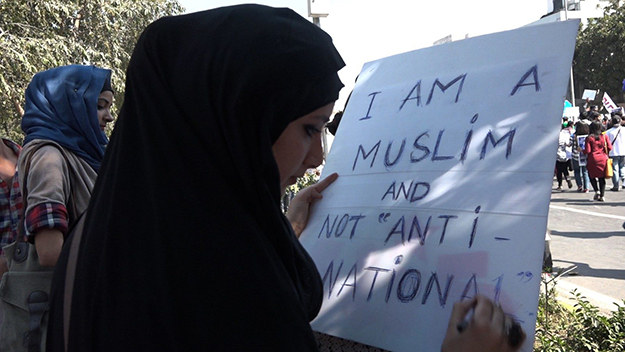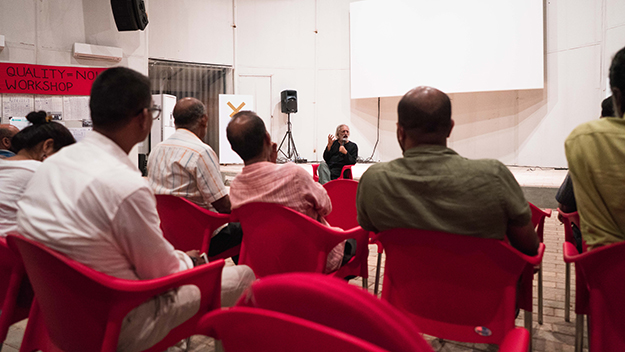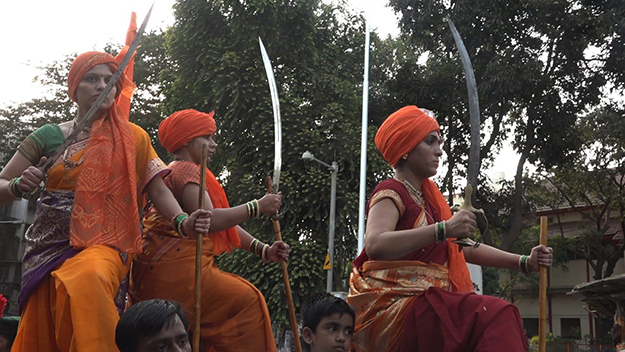Report on Reason
Reason screens on Saturday, April 20 as part of the Art of the Real series at Film Society of Lincoln Center.

Reason (Anand Patwardhan, 2019)
Preeminent Indian documentarian Anand Patwardhan introduced a recent screening of his latest film with a request that seemed rather unusual, especially in a world where news travels fast.
“Please don’t post anything on social media,” he said to the dozens of people gathered on a Tuesday evening at the Pavilion in Fort Kochi, an intimate venue that hosts daily live events during the Kochi-Muziris Biennale in Kerala, India. “I’m taking the film to other parts of the country soon, and I don’t want it to be shut down.”
The film in question was Reason, Patwardhan’s exhaustive, eight-part essay on the rise of Hindutva in India, which premiered last year to great acclaim at film festivals in Toronto and Amsterdam. In Kochi, however, it was screened a bit differently. For one, it was split into halves and screened over two evenings to make its four-hour runtime more palatable. Moreover, it was presented here as a “Work-in-Progress”—a ploy to evade India’s censorious Central Board of Film Certification (CBFC), which approves every film before its public exhibition in the country.
The wariness surrounding the screening brought to mind the circumstances surrounding Patwardhan’s debut feature, Waves of Revolution. A fiery account of the 1974 anti-corruption movement in Bihar, the film was screened in clandestine venues in 1975, during the repressive days of then-Prime Minister Indira Gandhi’s Emergency rule.
If you think the comparison between the India of then and now is unjustified, Reason might convince you otherwise. The documentary minces no words (or images) in castigating Prime Minister Narendra Modi’s Bharatiya Janata Party (BJP) for its assault on secular democracy. But the film is persuasive in part because it understands—and vividly demonstrates—that the incursion of Hindutva, or Hindu nationalism, into the Indian public sphere began well before the BJP’s victory in the 2014 elections. “The film is about the last four years,” said Patwardhan in his introduction, “but the project of turning our country from a secular to a Hindu Rashtra (nation) started almost a hundred years ago.”
Reason begins even farther back, with archival footage illustrating the divide-and-rule policies of the British that sowed the seeds of an enduring hostility between Hindus and Muslims in the Indian subcontinent. But the film takes as its origin point—and its framing argument—the assassination of Mahatma Gandhi in 1948 at the hands of Hindu nationalist Nathuram Godse. Godse was involved with the Rashtriya Swayamsevak Sangh (RSS), a militant, right-wing Hindutva organization that was banned several times in the years after Gandhi’s death for various instances of communal violence. With the rise of the BJP—which began as the political offshoot of the RSS—this history seems to have been either forgotten or normalized, bemoans Patwardhan. Several times in the film, he questions BJP and RSS supporters about Godse’s political affiliation, only to be answered with silence or vehement denials.

Anand Patwardhan discussing Reason (2019) following a screening in Kochi, India. Photo by Richard Tamayo.
Gandhi’s assassination is the prelude to a series of murders, deaths, and arrests that form the throughline of Reason. The first four chapters of the film, which screened on Tuesday, detail the lives, the activism, and the mysterious deaths-by-shooting of leftist rationalists Narendra Dabholkar, Govind Pansare, and M.M. Kalburgi in 2013 and 2015. The latter sections present moving accounts of the 2015 suicide of Dalit (“untouchable”) PhD student Rohith Vemula and the 2016 arrest of student-activist Kanhaiya Kumar on charges of sedition.
Alongside these stories, Patwardhan captures on camera the various incarnations of Hindu nationalism taking over the country: attempts to rewrite and “Hinduise” Indian history; atrocities committed against Muslims and Dalits, especially in purported defense of cows; and the Modi government’s implicit endorsements of various radical Hindu-right organizations. One section is devoted to one such organization, the dubious “Sanatan Sanstha.” Headed by a mysterious, weapons-fetishizing hypnotherapist who claims India will become a Hindu nation by 2023, the Sanstha has been linked to the murders of various rationalists and activists, with little action taken against the accused. In laying bare these connections and documenting the growing violence, Patwardhan carefully articulates the distinction between Hinduism (“a dynamic composite of indigenous cultural practices,” per his directorial note) and Hindutva (“a project of supremacy.”)
“I wish I could rewatch the film and etch it into my mind so I can go home and explain it to my mother,” an audience member said during the Q&A on Wednesday, the second night of the screening. In many ways, that statement encapsulates the purpose of Patwardhan’s film: to catalog and to elucidate to a regular citizen the complex, often nebulous workings of Hindu nationalism. Barring a few sections, Reason is not exactly an investigative documentary; all the killings and arrests and protests it presents on screen have been reported widely in the news. But by bringing these disparate elements together with assiduous, even tedious, detail, Patwardhan makes undeniably clear the threat that Hindutva, if unchecked, presents to Indian society. His film is partly an archive and partly an argument—both of which are essential in a country where history and free speech are under increasing attack.
Patwardhan often places himself inside the action, capturing rallies and protests in thrilling vérité style, sometimes at great personal risk. (At one point in the film, speakers at a Sanatan Sanstha press conference openly call for Patwardhan’s bones to be broken—while the director is present in the room). Patwardhan said during the Q&A that he prefers to film at rallies because it’s the easiest way to get access to people who don’t like him. But it also highlights the participatory tendency in his filmmaking. The screening at the Biennale, and the country-wide tour that it’s part of, are an extension of that tendency. Patwardhan said he wants to show the film all over India before he takes it to the CBFC, in the hopes that it contributes to the public discourse surrounding the general elections currently ongoing in the country.

Reason (Anand Patwardhan, 2019)
Patwardhan has had a long and contentious history with the CBFC, known colloquially in India as the “Censor Board.” Nearly every one of the 11 documentaries he has directed in his 48-year career have faced some or other form of resistance from the statutory body. A Time to Rise (1978), an account of Indian farmworkers’ activism in Canada, was asked to be trimmed in order to maintain “friendly relations with foreign states.” Citing “law and order” concerns, the CBFC ordered several cuts to In the Name of God (1992), which provided a disturbing glimpse into the Hindu right-wing campaign to dismantle a historic mosque in Gujarat. War and Peace (2002), a condemnatory account of the Indian state’s turn towards nuclear militarism, was banned in its entirety. In each of these cases, Patwardhan was forced to petition a higher court, which invariably struck down the CBFC mandate.
The 68-year-old filmmaker pointed out in the Q&A that his experiences of censorship had spanned the regimes of both the BJP and its main rival, the center-left Indian National Congress. India’s track record with freedom of speech has always been poor. But the stakes seem to have risen in the last four years. Last September, international writers’ body PEN International released a report condemning the state of free speech in Modi’s India, outlining “how dissenting voices, be they journalists, writers, academics or students, face intimidation, harassment, prosecution, online abuse and physical violence.” The Hoot’s 2017 India Freedom Report counted 54 reported attacks on journalists, at least three cases of television news channels being banned, 45 internet shutdowns and 45 sedition cases against individuals and groups between January 2016 and April 2017.
Reason itself ends with an ode to a murdered journalist: Gauri Lankesh, a critic of Hindu right-wing extremism, who was shot outside her home in September 2017. “The struggle is no longer about censorship, but about survival,” Patwardhan said after the Wednesday screening. “But we can’t be scared. If we shut up, we’re already dead.”
Devika Girish is a freelance film critic. She grew up in India and currently lives in Los Angeles.







